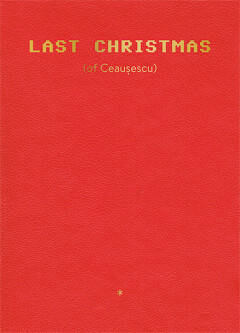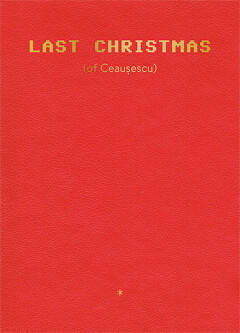
- Afhalen na 1 uur in een winkel met voorraad
- Gratis thuislevering in België vanaf € 30
- Ruim aanbod met 7 miljoen producten
- Afhalen na 1 uur in een winkel met voorraad
- Gratis thuislevering in België vanaf € 30
- Ruim aanbod met 7 miljoen producten
Zoeken
€ 29,00
+ 58 punten
Omschrijving
At the end of 2019, 30 years after the system change, an EU resolution was passed calling on the Romanian state to officially process the past events. While the overthrow of other communist dictatorships in 1989 was mostly peaceful, Romania's revolution ended in a bloodbath. To this day the dead have not been atoned for. Through a rapid visual choreography, artist and photographer Anton Roland Laub recounts the fall of Romanian dictator Ceauescu. On his escape on December 22, 1989, Nicolae and Elena Ceausescu are arrested at Targoviste, of all places where Vlad the Impaler alias Dracula once resided. On Christmas Day 1989, the couple is sentenced to death in a brief show trial. The death sentence is carried out immediately. On the second day of Christmas the pictures of the execution go around the world. The place of execution in Targoviste, the private house of the Ceausescus in Bucharest as well as the never inaugurated ruler's palace are today open to the public. They are 'traumatized' places, silent witnesses of an undead past. Parallel to this, Laub follows the story of a typewriter in front of a green-screen, a symbol of the draconian control over the written word and the surveillance of system criticism.
Specificaties
Betrokkenen
- Auteur(s):
- Uitgeverij:
Inhoud
- Aantal bladzijden:
- 144
- Taal:
- Engels
- Geïllustreerd:
- Ja
Eigenschappen
- Productcode (EAN):
- 9783969000137
- Verschijningsdatum:
- 11/02/2021
- Uitvoering:
- Hardcover
- Afmetingen:
- 165 mm x 227 mm
- Gewicht:
- 560 g

Alleen bij Standaard Boekhandel
+ 58 punten op je klantenkaart van Standaard Boekhandel
Beoordelingen
We publiceren alleen reviews die voldoen aan de voorwaarden voor reviews. Bekijk onze voorwaarden voor reviews.











